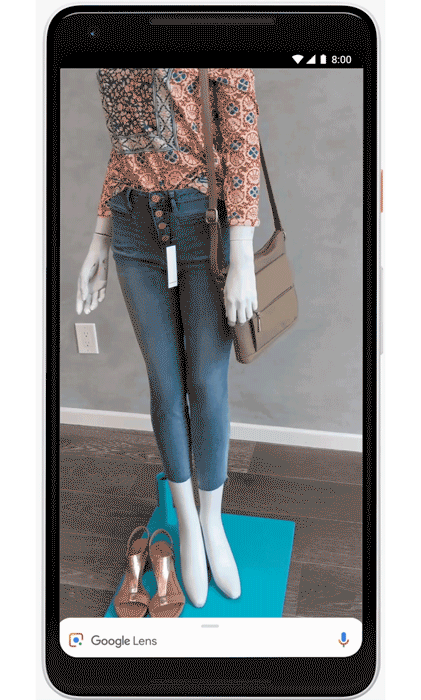Ecommerce businesses have a love-hate relationship with image search. They appreciate the conversion benefits, but they are wary of the labor required to optimize images and the risk of competitors stealing them.
Google’s announcements this week, however, show its commitment to searching the visual world and hint at the importance of image search and image search engine optimization to site owners.
Google Lens
Earlier this week, at Google’s I/O 2018 conference, the search giant announced Google Lens, its latest rendition of image search based on image recognition and visual analysis. Google Lens is being hailed as an augmented reality success, closer to fulfilling the promise of its predecessors, Google Goggle and Google Glass.
While searching for the name of a building may not have much impact on ecommerce SEO, Lens can do some compelling tricks that hit closer to home. For instance, it can decipher text and allow you to search on the contents, or copy and paste them into another app.
In the (near) future, starting first with Google’s Pixel phone, it will work within the native camera app to comparison shop based on, for example, an image of an outfit. Google has not released firm dates for this upgrade, but it demonstrated the capability at I/O this week.

Google’s Lens example shows shopping for an outfit on an iPhone.
I tested the original (less-robust) version on Lens my Samsung phone, with encouraging but mixed results. Notice below that it finds the text in the image — even on my hand-written note — but misreads much of it. Not surprisingly, I suppose, it didn’t recognize my child’s writing on the pen holder. You can test Lens’ functionality, too, from an Android phone in the Google Photos app.

Text recognition in Google Lens is impressive but has room for improvement.
Future of Image Search
What does Google Lens say about the future of image search? A lot.
For the 20 years, Google has relied on textual content to provide relevant search results. That relevance is key to Google’s value proposition — it’s the reason for 3.5 billion searches per day. All of those searchers equate to dollars from the sale of advertising and from monetizing the data.
But searchers demand ever-more-relevant results. And one of the primary ways humans determine relevance is through visual analysis. Google needs to follow suit. It’s the same with audio analysis and voice search, other Google initiatives.
By applying its sophisticated contextual analysis, Google is working to gain our trust for image search. This isn’t your father’s image search, wherein the content of the image was judged entirely from the nearby text. It’s the next step into cataloging the earth’s information.
And if you want it to sell your products, it’s time to hop aboard.
Grow and Thrive
I hear from ecommerce companies who do not want to optimize for image search because they don’t want Google offering up their images for others to steal. But if someone wants to steal images, he can do it easily — without Google. And it’s no excuse to avoid a strategy that could drive additional revenue.
Another reason is that it seems hard. All of those images are already live on the site, and to go back and add the elements to optimize for image search seems like an impossibly large task. But it doesn’t all have to be done manually. With the help of your developers, the page templates and modules can be modified to include the necessary data and text. And, you only need to manually optimize the pages and products that will return the highest value.
Lastly, ecommerce managers don’t want to lower their conversion metrics with traffic that will come to a page, window shop, and then go to another site to look at another image. But shopping is the purpose of an ecommerce site. You get plenty of looky-loos today. Your job is to entice them to stay — to click other products and ultimately make a purchase.
In natural search, every page is an entry page. It’s incumbent upon merchants to design their sites to capture and convert ever-more of those visits to sales. The task may be harder with image search. But increasingly, consumers may see a product, snap a photo of it, and use Google Lens to find it, to purchase.
In other words, image search will enable ecommerce to grow and thrive.